Whether you plan in advance for your camping or wing it, here are the tools that we use in our search for ideal camp spots. Unfortunately, there does not yet seem to be one unified resource listing all camping opportunities, so we utilize many different resources.
We released the first version of this guide in November 2009, and it’s time for an update, as there are many new resources available today!
Types of Camping
It’s good to first have some familiarity with the types of camping available:
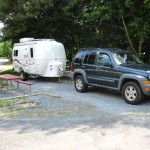 Commercial/Private Campgrounds: Privately owned and operated campgrounds, they can be easy to find. They offer a full range of amenities; from bathhouses, laundry, WiFi, hook-ups, pools, hot tubs, recreation activities, gas/propane, stores and cable TV. These also come at a price, and can be quite crowded leaving little to no room between rigs. There are also membership RV Park clubs that you can join and have access to their park systems.
Commercial/Private Campgrounds: Privately owned and operated campgrounds, they can be easy to find. They offer a full range of amenities; from bathhouses, laundry, WiFi, hook-ups, pools, hot tubs, recreation activities, gas/propane, stores and cable TV. These also come at a price, and can be quite crowded leaving little to no room between rigs. There are also membership RV Park clubs that you can join and have access to their park systems.
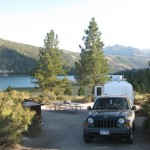 Public Campgrounds: These a government run (city, county, state and national) recreational parks that provide developed camping. The amenities and costs vary widely from just providing a spot to park with a picnic table to full bathhouses and electrical hook-ups, so do your research first if you have requirements. They’re usually a bit off the beaten path in gorgeous non-crowded places and less expensive than commercial campgrounds. Of course, some states with budget crunches have increased their rates to higher than surrounding private options.
Public Campgrounds: These a government run (city, county, state and national) recreational parks that provide developed camping. The amenities and costs vary widely from just providing a spot to park with a picnic table to full bathhouses and electrical hook-ups, so do your research first if you have requirements. They’re usually a bit off the beaten path in gorgeous non-crowded places and less expensive than commercial campgrounds. Of course, some states with budget crunches have increased their rates to higher than surrounding private options.
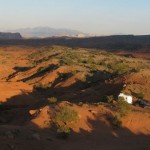 Boondocking/Dispersed Camping: Boondocking refers to camping without provided amenities. Some public lands allow for dispersed camping, which are not developed campsites. The rules vary by agency and location, but generally you just need to find a spot off the road, away from water and leave no trace. Popular boondocking spots have primitive roads or worn trails leading to them. Other boondocking options include staying overnight in Wal*Mart, Flying J, truck stops, rest areas or city roads.
Boondocking/Dispersed Camping: Boondocking refers to camping without provided amenities. Some public lands allow for dispersed camping, which are not developed campsites. The rules vary by agency and location, but generally you just need to find a spot off the road, away from water and leave no trace. Popular boondocking spots have primitive roads or worn trails leading to them. Other boondocking options include staying overnight in Wal*Mart, Flying J, truck stops, rest areas or city roads.
Check Maps
We primarily use Google Maps on our iPhones & iPad and a Garmin StreetPilot 2720 for our navigating, and will utilize these resources to scope out potential camping locations. Sometimes, just doing a location based search for ‘campground’ or ‘RV Park’ will yield results for us, and then we can further research options from there.
Paper Maps
Yes, even in a digital age – paper maps can be a valuable resource. Some maps are quite good about marking public campgrounds, even if only with a symbol. We carry the Rand McNally Road Atlas 2010,USA/Canada/Mexico with us, as well as a variety of state maps we pick up at welcome centers when we cross into new states and AAA maps.
You’ll still need to research the area to find out the name of the campground. We’ve also found it’s quite often the case that national forests have far more developed campgrounds than maps show, and talking to a ranger is most helpful.
Computer Maps
When we first started out, we used Microsoft Streets & Trips on our laptops, but have since found that we hardly ever use it anymore given the number of other resources now available. This can be a great option however if you don’t have internet access to browse maps online, and many of them also offer GPS navigation.
Mobile Applications
When we first starting looking for iPhone apps to create on our own – a campground locater was tops on our list. At the time, we could find no decent options. More recently however, there seem to be a bunch of them – and we’ve been trying out several. There still does not seem to be one single app that does everything – but there are some promising options. We find ourselves using a combination of apps on our iPhone depending on the situation and type of camping or overnight parking we’re looking for.
 |
RVParking.com – Free This app has more than 18,000 listings in their database, which is also accessible online at their awesome RVParking.com park review site. Both the website and app are newer, and the database is still being fleshed out. We’ve found many duplicates, bad addresses, missing parks, and listings for mobile home parks that don’t allow RVs – but they are actively improving this by hiring factcheckers, and are actively listening to user feedback to improve the service. They do have a unique angle that we’re really excited about – integrating in full park info, user reviews, photos and profiles. We’ve been enjoying leaving reviews, and would love to see this website adopted by others. If it can get a lot of following, it stands to be an excellent central source for finding RV Parking information on the go. And as a free app – it’s definitely worth checking out (just be prepared to do a bit of fact checking until the database gets cleaned up.) |
 |
Camp & RV by Allstays – $3.99 This app features a wide variety of RV camping and overnight options – including some public campgrounds, private campgrounds, KOAs, truck stops, Walmarts (including those that don’t allow overnighting), rest areas (including wifi & RV dump availability) and RV repair & parts stores. Each category shows up on maps with nicely labeled pins so you can quickly scan for what you need. The interface is fairly intuitive, and we like that the maps auto update with camping options as you scroll around. We’ve found a fair amount of discrepancies in the database, and a lot of missing campgrounds, so it is not entirely comprehensive. The app has built in feedback to the developer to submit corrections. As this is the only app that tracks free overnight parking options, we mainly use this app when we’re in transit and just in need of a place to sleep for the night. |
 |
Campwhere – $5.99 This app only covers public campgrounds – including city, county, national, state, forest service, BLM and Army Corp of Engineer campgrounds. Since this is our preferred camping style, this app has been a great tool for us to quickly find our public camping options. The database seems pretty comprehensive and accurate, and smartly leaves off campgrounds that are not accessible by vehicle. In the map view, each type of campground is displayed in a different color. The user interface is so incredibly well done, that we wish they had a version that was completely comprehensive of all camping & overnight options so we could only use one app. There is not much information to be found for each campground listing aside from the number of sites they have, coordinates, weather forcast and web link. The app would be more useful if it listed amenities provided, prices and more. Overall, for finding public camping options, this is our top choice app – especially since the app now also works full-screen on the iPad. |
If the three apps above could be merged into one comprehensive, user friendly app – we’d be very happy campers! (The above links are affiliate links, we’ll get a small cut if you buy via them – but we only recommend products we actually love.)
Check for Free/Cheap Campgrounds
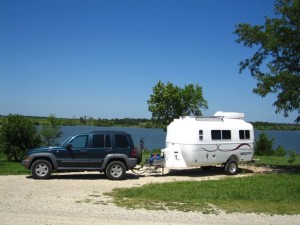
There are places where you can legally stay for free or very cheap. These are a mix of boondocking and developed campsites—usually run by small cities (to attract tourists), counties or national services. Some of these have been our most spectacular campsites along our journey.
Some retail locations—where allowed by local ordinances—have also opened their parking lots to overnight stays by RVers, most well known being Wal*Mart, Travel Centers and Casinos. Also, in many states, staying overnight in a rest stop is permissible. Sometimes, you can get away with parking on a public street for a night or two.
Some of our favorite resources for finding free camping:
OvernightRVParking – A collaborative resource of places for free or cheap overnight parking locations. The cost is $24.95 a year to join (and then you get free extensions when you add information to the database). Our favorite parts about this site are that they show the parking spots on a map (very useful) and provide very detailed information that is double checked by the site’s administrator. Unfortunately, with their subscription price – we’re concerned that this resource will be come less useful as less people will pay for access and contribute towards the data (we find the price highly worthwhile). For now, a very comprehensive listing – and we’d love to see their database released as a mobile phone application for easier access while on the go. If you decide to join, mention you heard about it from Technomadia, and they’ll give us BOTH a free extra month of service.
FreeCampgrounds.com—a searchable database of free and under $10 camping locations, entered in by other campers. Many listings also have reviews and additional tips on finding the place and confirmations of details. This is a free resource run by RVBookstore.com (who does advertise their books throughout the site), and information is not fact checked by anyone – so be sure to read follow-up comments and double check information.
FreeCampsites.net – A well designed site with interactive maps cataloging free camping by state run by fellow younger RVers. We love that they utilize maps to find locations. They concentrate on listing scenic public spots, as opposed to retail parking lots for convenient overnight stays enroute.
Days End Directory – If you’re a member of Escapees.com (a great resource for full time RVers, even offering services like insurance, mail forwarding, etc), then for just $10 you can have access to this extensive directory of free camping options that is regularly maintained by other Escapees members. (Note, we’ve personally not used this – but have heard great things about it from many trusted friends.)
Boondocking.org—Run by our friend and fellow nomadic-soul, Andrew Koransky, contains a database of coordinates to legal boondocking sites.
Some of these options require some familiarity with the area you’re in or going to, so be sure to know the names of local cities to help in your search.
Check Online Resources
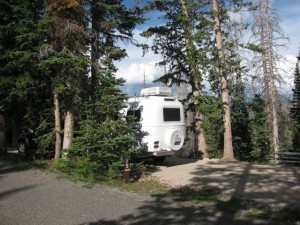
Of course, just searching online via your favorite search engine (Google being ours) yields great results! We find a lot of our great camping by just searching for ‘free campground <city name>’ or ‘RV camping near <city name>’ or other such variations. You’ll find personal blog postings and websites that might mention great places people have found.
Here are some of the online resources that we’ve found to be quite useful for finding campgrounds:
RV Parking.com— This is a rather new site that we’re quite excited about. It allows users to browse for campgrounds and leave reviews. Unlike other review sites we’ve used, the reviews clearly indicate who left the review and point to their user profile – so you can better find reviewers who enjoy similar camping styles as you do. Our favorite feature is that they also have a free iPhone app to find campgrounds while you’re on the go. The database is still being fleshed out for accuracy – but once it is, we suspect this will be THE place to go to get reliable reviews and information on all sorts of campgrounds. Basically – if we were creating a RV Park guide, this would be how we’d do it. So come join us there, and leave reviews of your own to help contribute to this great project! So far.. it’s free!
State Park Guides—Most states have a central website that lists all their state parks, using Google to find them is generally quite easy. A lot of states have gone to using ReserveAmerica for their online reservations —which is another option for researching. Reserving your site (and paying the ‘convenience fee’) isn’t always necessary unless it’s peak season, a weekend, a popular spot or you just want to make absolutely sure you have a spot saved for you.
National Park Services— Use this search tool to find information on camping at National Parks (including National.Monuments, National Recreation Areas, etc.). Only a few national park campgrounds are reservable, and use recreation.gov to pre-book sites.
National Forestry Services—Use this site to look up a forest or grassland for information on both developed and dispersed camping options.
Recreation.gov– The source for reserving government run campsites. It generally only covers the more popular and reserveable campgrounds, so it’s not nearly comprehensive.
Army Corp of Engineers – These are some of the most under promoted campgrounds, and they’re usually quite spectacular —and free to cheap. You’ll have to use their website to track them down, and it’s often times not intuitive to do. Our trick is looking on maps for lakes and dams (where most ACOE campgrounds are), and then searching based on local cities and landmarks.
Bureau of Land Management (BLM) – A government agency managing land in many of the western states of the US. Dispersed camping is generally allowed on BLM land, unless otherwise noted and some even have developed campgrounds.
RV Park Reviews—The long time standard in finding RV Parks and reviews. An older and clunkier user interface than RVParking.com, but a wealth of history of reviews.
Useful Campground Books
We carry a set of campground books in our tow vehicle that give us a quick way to look up relevant information about public camping options we’re considering. Sometimes looking something up online is just more frustrating than it’s worth. The books give us directions, amenities available, descriptions and prices.
The books we carry with us include:
AAA Campground Guides
Casino Camping – Guide to RV-Friendly Casinos – 4th Edition
National Park Service Camping Guide, 4th Edition
When all else fails: Trust Nomadic Serendipity
 Sometimes, ideal camping spots just manifest themselves when we need them. There have been several times when we’ve found camping spots without actively looking for them – either by stopping and talking with locals and other travelers, following those handy little campground road signs or not being afraid to peak down a little dirt road into a forest.
Sometimes, ideal camping spots just manifest themselves when we need them. There have been several times when we’ve found camping spots without actively looking for them – either by stopping and talking with locals and other travelers, following those handy little campground road signs or not being afraid to peak down a little dirt road into a forest.

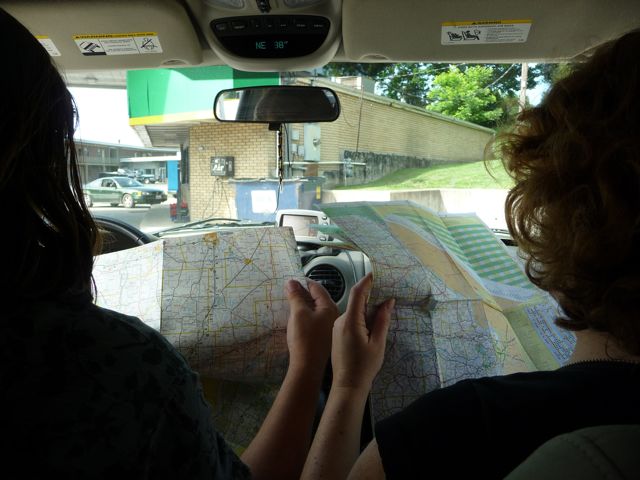

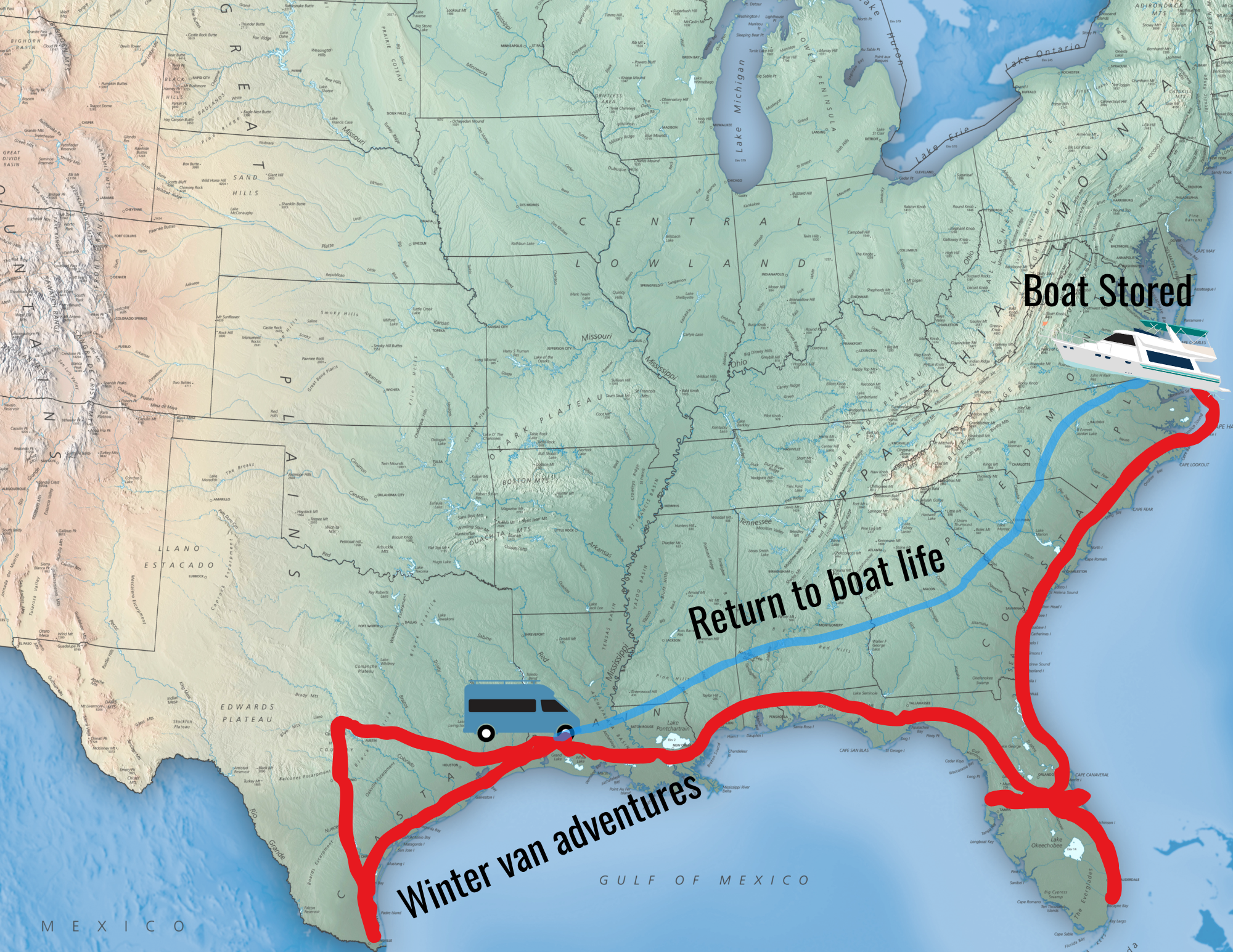
I love your site!! Such great tips! My husband and I are traveling all of New England and parts of Canada and always have a hard time finding RV campsites that are reasonable pricewise.
Thanks for putting together such a great and comprehensive guide! This will really be helpful as I am just getting ready to get back on the road, after my Dad who was 96 just passed away after several years of my being his caretaker full-time.
You are probably aware, but for your next update, AAA quit publishing campground directories after 2011. They sell regional editions of Woodalls to members for a reasonable price. I am now more likely to keep an up to date Woodalls on hand but I miss also having the different viewpoint of AAA.
More important, I enjoy Coverage? on my iPod Touch. But my smartphone is a D—- as are the handsets of friends that I show your app to. Oh well!
I have had VZW and predecessors 20 years and have two other prepay handsets. This Summer I upgraded(?) Boost to CDMA (Sprint) and ATT GoPhone to 3G UTMS. Three out of four on Coverage? isn’t bad.
Great post! Would you believe I was just sitting here writing a post about finding campgrounds when yours came in via e-mail. I must say your one is superior
Chris and Cherie,
Very informative post. I’d heard of most of your sources but it’s helpful to have them all in one place. Your topics are points of interest for me so I’m marking your site so I can read the archives as I get time. Love your blog design. Technomads! Wish I’d coined that one.
Thanks for putting together such a great and comprehensive guide! This will really be helpful as we are about to embark on a journey in a 22′ VW Rialta.
Looks like lots of good information here on your site, I will definitely be reading, thanks!